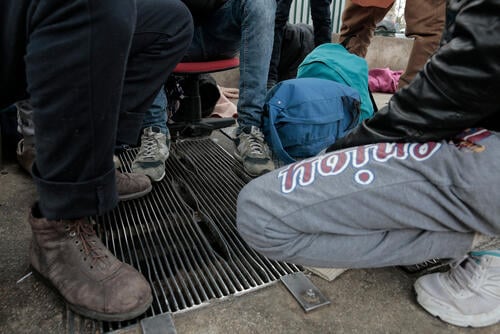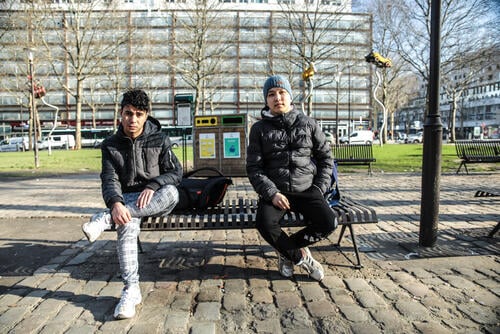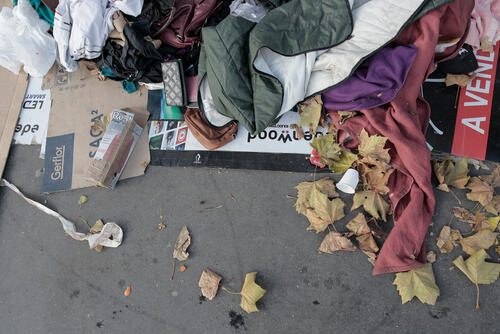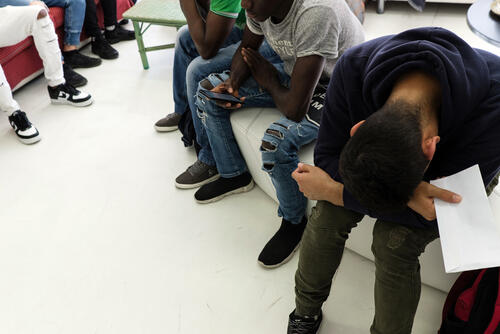Young foreign nationals continue to arrive unaccompanied in France and for some, recognition of their minority status can be an arduous process. Médecins Sans Frontières has released a report, Unaccompanied minors: symbols of a policy of mistreatment, based on our experience with vulnerable adolescents at our day centre in Paris.
While the full report is available for download in French, the executive summary has been translated into English and is available below.
Executive summary
More and more young foreign nationals continue to arrive unaccompanied in France. The majority are from Mali, Guinea, Côte d'Ivoire or Afghanistan. In 2017, the Ministry of Justice’s Unaccompanied Minors Department put their number at 14,908, up from 8,054 the previous year.
For some adolescents, obtaining recognition of their minority status can be a long and gruelling process. As minors with no family in France, they have to turn to France’s départements to be placed in the care of Child Protection services.
Increasingly often, Départements refuse to take responsibility for these young people whose minority they dispute, forcing them to sleep rough with access to neither child nor adult reception centres. “Neither nors”, i.e. neither minors nor adults, has become a fitting label for these youngsters.
Young people can initiate court proceedings to obtain recognition as minors and the protection this status affords them, but the process is lengthy and complex. For the thousands of adolescents finding themselves in this situation, the legal process for securing access to accommodation and health care is a veritable obstacle course.
In the name of the principle of the best interests of the child, the law requires France to protect such young people and provide them accommodation, health care and education until such time as the process is concluded. However, this is far from the case.
In December 2017, prompted by the distress and vulnerability of these young people, Médecins Sans Frontières (MSF) opened a programme in north Paris suburb Pantin to offer them a comprehensive range of support services ─ nursing care, mental health support and social and legal assistance. The figures presented in our report are derived from the assistance provided to 787 minors from when the programme first opened on 5 December 2017 to 31 December 2018.
87 %
87%
34 %
34%
51 %
51%
Unaccompanied and extremely vulnerable minors
They may have encountered violence in their countries of origin (war, armed conflict, domestic violence), during their journeys (kidnapping, arbitrary detention, torture, traumatising sea crossings, death of a friend or relative), or in the environment young people in distress face when they get to France (forced to sleep rough in inhumane and degrading conditions, psychological trauma caused by the unremitting scepticism they are subjected to when recounting their journeys, to name but a few).
Eighty-seven per cent of the young people interviewed by the MSF nursing team said they had experienced violence, torture or abuse during their journeys.
Young people attending minority assessments in France are given no access to medical check-ups, vaccinations or screening services.
Only those recognised as minors after assessments and placed in the care of Child Protection Services are given access to medical care provided by universal health protection. Young unaccompanied foreign nationals not recognised as minors can only claim State Medical Assistance, which is reserved solely for undocumented adults. Obtaining entitlement of their rights is an uphill struggle for young people who often sleep rough and therefore cannot produce proof of a fixed address.
Thirty-four per cent of the patients who attended MSF's mental health unit were suffering from psychotraumatic stress disorders requiring immediate treatment.
The medical care available to young unaccompanied foreigners is arbitrary and varies from one health facility to the next ─ sometimes they’re treated as minors, and others as adults.
Fifty-one per cent of the adolescents assisted by MSF were sleeping rough at the time of their first visit to the centre.
For the most part, legally-recognised organisations, such as socio-medical centres, health centres for people in difficulty and entities that provide addresses, are unable to cope with demand, and their staff do not have the necessary training to be able to assist such a specific, and particularly vulnerable, population. And, when serious illness is diagnosed, obtaining a referral to specialist services can be problematic. The lack of effective coordination of the care pathway can result in a denial of care.
An inadequate system for protecting unaccompanied minors
Minority assessments conducted by départements are not standardised at national level and numbers vary substantially from one to another. The requirement to provide unconditional, immediate temporary accommodation for a minimum of five days during the assessment process is often unmet, which condemns vulnerable young people to sleeping on the streets.
Interviews are often conducted hastily (in the case of 40 per cent of the young people, they lasted less than 30 minutes) and sometimes without the presence of an interpreter. Assessments can be rejected on the grounds that a young person "clearly looks like an adult" (10 per cent of the young people).
Any at-risk minor can go to court to obtain protection, and in the case of unaccompanied minors, this protection means being placed in the care of Child Protection Services. But for unaccompanied youngsters who understand neither the French language nor the intricacies of the legal system, going to court is a complex process necessitating the assistance of an association.
It can take a long time, and some young people, who in the interim have neither accommodation nor protection, give up along the way. Additionally, a lack of identity documents can be a barrier to the legal process, with some judges ruling they have no jurisdiction to hear the cases of minors not in the possession of identity documents (11 per cent of rulings).
Nevertheless, recourse to the courts is essential to protect young people départements refuse ─ wrongly ─ to place in the care of Child Protection Services. In a clear illustration of the shortcomings of the assessment process, 55 per cent of the young people MSF assisted were placed in the care of Child Protection Services, and half of those who applied to the courts benefited from a temporary placement order that enabled them to be provided accommodation while awaiting the court’s decision.
Identity documents are essential to corroborating the age of unaccompanied minors. However, judges and officers conducting assessments often cast doubt on their authenticity and call on the national fraud agency to analyse them. Its conclusions are not always reliable because of insufficient knowledge of the laws and practices of the countries that issued them.






